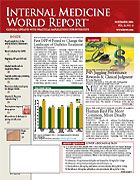Publication
Article
Internal Medicine World Report
Physicians Urged to Increase Flu Vaccination
Author(s):
From the American Lung Association
NEW YORK CITY—Hoping to improve years of lagging influenza immunization rates, the American Lung Association has launched a public awareness initiative aimed at putting a “face” on this serious, potentially fatal disease. The campaign, called “Faces of Influenza” (www.facesofinfluenza.org), recruited public health officials, celebrities, and other patients to tell their stories about influenza and to encourage vaccination among high-risk groups.
“Physicians are key to raising the influenza vaccination rates across our nation,” Admiral John O. Agwunobi, MD, MPH, assistant secretary for health, US Department of Health and Human Services, tells IMWR. “I’d like to get every physician to see it as an obligation, as a mark of pride that they have the highest percent of their patients vaccinated at the end of flu season.”
Dr Agwunobi outlines 2 key messages for physicians. “First of all, it makes a lot of sense to model what you are asking your patients to do by getting vaccinated yourself. It not only makes great symbolism—‘I’ve been vaccinated; I urge all my patients to get vaccinated’—it actually makes great public health sense to get the entire healthcare system protected so that they can protect others and not become a source of spread.”
The second point begins with physicians recognizing “that they are the most trusted source of information for most patients and that prevention is always better than a cure. This is a great opportunity for them to begin urging their patients, their friends, and their families to get vaccinated.”
Dr Agwunobi emphasizes that it is particularly important for internists and geriatrics specialists to ensure that all their patients schedule annual flu vaccination appointments. “As a standard, recurring practice makes a lot of sense. It helps build the habits and the behaviors that we’re trying to encourage today.”
He is cautiously optimistic that this year’s vaccine supply will be sufficient to meet the demand. “We are predicting the highest amount of flu vaccine ever in our history, if everything goes well. Although it will come in through the course of October and into November, people can get vaccinated all the way up into the early spring.”
Although manufacturers are on track to produce up to 100 million vaccine doses, Dr Agwunobi notes that since there are different companies delivering at slightly different dates, “early on, we may see, not shortages, but distribution mismatches, where there are people ready to be vaccinated but that particular company hasn’t delivered yet.”
Nevertheless, he believes “there will be enough vaccine for everyone who wants it.” Although the focus is on high-risk individuals, such as the elderly and children aged 6 months through 5 years, “if you are a parent or a grandparent of a young child, this would be a great opportunity to get vaccinated so that you don’t become the source of infection to somebody else in your family.”
Educational materials, including an office poster and patient information handouts, are available at www.facesofinfluenza.org/health_care_provider.php.






